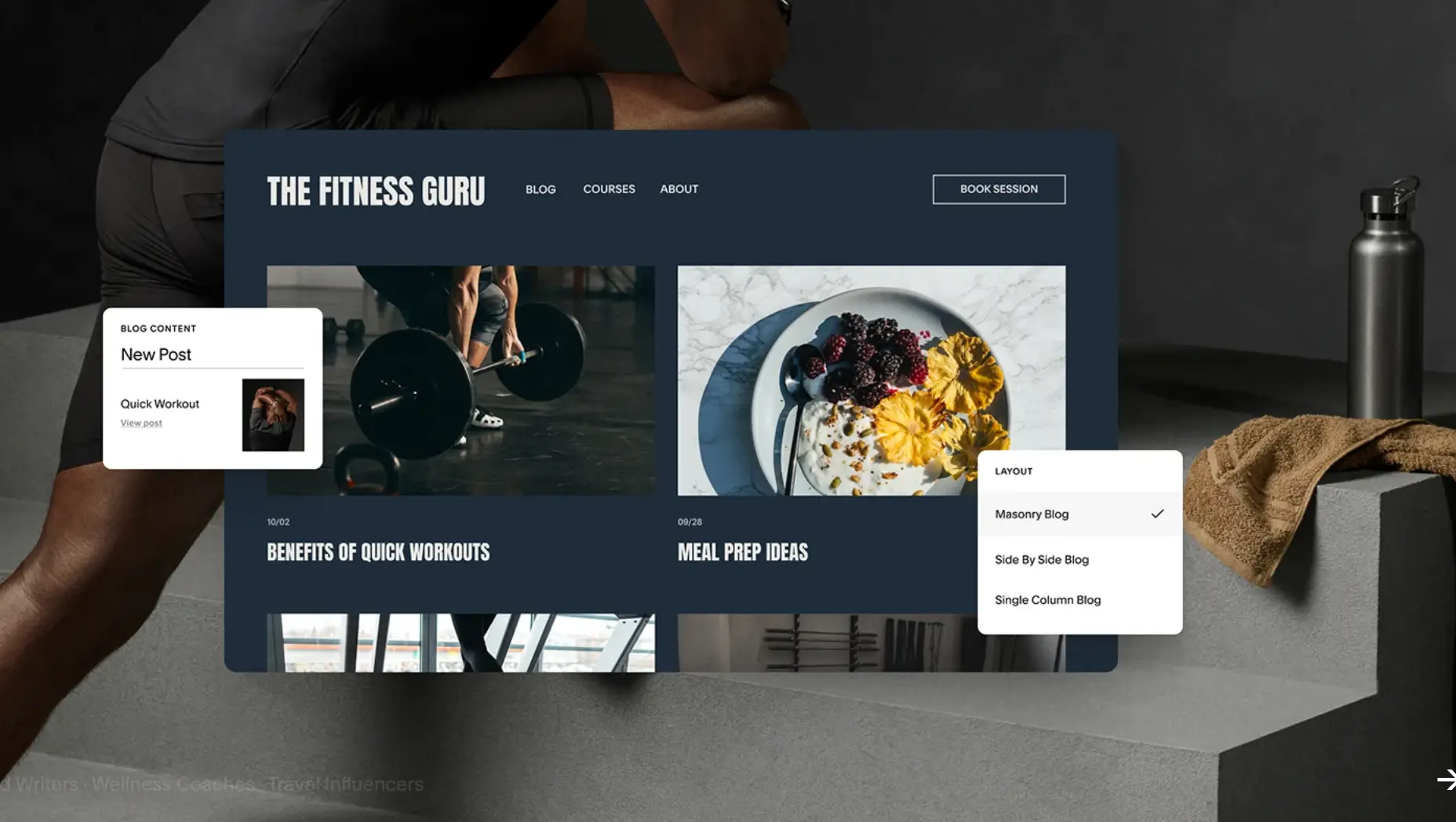
How to Remove Background Noise from Video in Premiere Pro (2025 Guide)
Let’s face it: there is nothing more frustrating than capturing the perfect shot, only to realize later that the audio is a disaster.

Let’s face it: there is nothing more frustrating than capturing the perfect shot, only to realize later that the audio is a disaster.

Comparing Webflow vs. WordPress vs. Wix vs. Squarespace for SEO in 2025? Your choice sets the ceiling for site speed & growth. We break down the trade-offs: performance, technical control, content scale, and which platform fits your team's capacity, from complex B2B (WordPress/Webflow) to solo founders (Wix/Squarespace).

The way we consume movies and TV shows has changed dramatically in recent years. Streaming platforms have grown so much that many people now prefer watching from home instead of going to cinemas. That shift affects the entire film industry, and also creates exciting opportunities for viewers who want top-quality experiences.

In today’s world, staying safe online is no longer an option—it’s a necessity. Between growing privacy concerns and the rising number of data breaches, everyone needs a simple way to protect their personal information. This is where iTop steps in.

Why Website Pricing in 2025 Feels All Over the Place? This guide breaks down the true cost of a professional website in 2025. Learn the typical upfront and ongoing budgets for DIY, freelancer, and agency builds, and discover the 7 key factors that move a project from simple design to strategic product development.
.jpg)
Learn how to publish a compliant and attractive Public Website Design RFP. This 2025 guide covers everything from defining outcomes and aligning budget to meeting new ADA Title II/WCAG accessibility rules. Attract top agencies and reduce project risk. (297 characters)

Complex websites are where navigation either quietly supports the business or quietly damages it. Large catalogs, multi‑audience portals, and app‑plus‑marketing ecosystems all depend on people finding what they need quickly and reliably. When navigation fails, revenue, trust, and compliance all suffer.

Discover the best fintech design companies. Learn how to choose the right partner and find agencies that create clear, scalable digital experiences.

There’s a moment many brands experience now, a quiet realization that the world has shifted. Visibility is no longer earned through the largest billboard or the most polished campaign.

Many companies today decide to migrate their applications to the cloud. A cloud environment offers several advantages, especially when it comes to flexibility and scalability. In the past, many organizations depended on servers that required a lot of maintenance and were difficult to scale.

The launch of the new Sidekick mechanic is an interesting turning point for Fortnite. Optimistically, it brings a new layer of personalization for the game played by around 1.5 million players every single day. On the other hand, Epic Games have prompted some questions about the effect on player experience and the long-term identity of the game.

Explore essential quantitative UX research methods in our definitive guide. Learn to leverage analytics, A/B testing, and user data to make informed design decisions.

The modern enterprise sales motion is a multi-threaded machine: SDRs qualify inbound leads, AEs orchestrate discovery and demos, solutions engineers run POCs, legal reviews contracts, finance approves pricing exceptions, and customer success manages renewals.

Perplexity has quickly become one of the most influential AI search engines in the world. Its conversational interface, citation-based answer system, and real-time web access make it a go-to platform for users researching products, services, and local businesses.

A practical workflow to cut approval time without risk. Roles, SLAs, change control, and a simple markup and audit trail.

Manufacturers must give SEO top priority as digital marketing grows in order to remain competitive in a crowded online market. In addition to increasing visibility, effective SEO tactics attract suitable clients who are actively looking for manufacturing services and goods.

In the Moment’s presto-paced digital world, the way lines are managed, delivered, and converted has shifted dramatically. With constant advancements in technology, businesses need to keep up with innovative ways to manage digital means.

Learn how software product development services help companies build scalable, market-ready digital products with speed and clarity.

Suspension and frame damage represent the most critical structural issues in salvage vehicles. Unlike cosmetic damage that affects appearance, structural problems compromise safety, handling, and long-term reliability. Identifying these issues before bidding protects buyers from purchasing vehicles that can never be properly restored.

Businesses and individuals in need of government services can now access it seamlessly through a Government Gateway Account. The online platform simplifies tasks for businesses and individuals.

Clear communication is one of the essential components for the success of digital marketing projects in the connected world we live in today.

Branded search is what happens when people type your name into Google instead of a generic term. Learn what a branded search is, why brand search volume matters, and how to optimize branded search so your site earns every high-intent click.

Discover how to design a telemedicine app that’s clear, inclusive, and trusted by every patient through simple UX, emotional tone, and user-centered design.

As a result of the fierce competition in the digital arena, companies are regularly looking for new methods of connecting with their audiences in an authentic way.

This article will delve into nine fields recognized for their difficult coursework, competitive entry requirements, or below-average GPAs compared to other university programs. Specifically, we’ll explore average GPAs (based on publicly available data where cited) to spotlight these demanding disciplines.

In tis article, we’ll explore the leading AI options for 2025, giving you a sense of how they work and why they might become your new go-to. Dive in, discover your ideal AI companions, and see how they integrate seamlessly into your workflow.

Discover how to optimize your brand portfolio with proven models—Branded House, House of Brands, and more—and learn strategies to build clarity, loyalty, and growth.

Explore 15 real-world vision and mission statement examples from top companies. Learn how to craft compelling statements that guide your brand, attract customers, and shape your business future.

Learn how to craft a powerful value proposition that highlights your brand’s unique benefits, solves customer challenges, and boosts loyalty and conversions.

Explore the biggest PR campaigns in history—from Nike’s iconic slogan to Dove’s groundbreaking social message—and see how these famous PR case studies shaped brand images worldwide.

A practical guide to the best domain registrars 2025, comparing pricing, features, and pros & cons. Find the perfect match to secure your website’s online home.

Discover the best business universities in the world 2025. Learn about their history, standout programs, and what sets them apart.

Craft a solid restaurant ownership strategy and learn which pitfalls to avoid. From budgeting for a new restaurant to customer engagement, here’s what you need to know.

If you’re looking to upgrade your career—or just curious about which paths offer the biggest financial rewards—it helps to zero in on roles that are likely to stand out among the highest paying jobs in 2025. Learn about these high payers and you’ll see why these careers rank among the highest paying jobs in 2025 and what it takes to get there.
.webp)
Today, we’ll explore eight standout names in the luxury fitness market. Some operate as giant wellness centers featuring everything from pools to child care, while others adopt a boutique approach with small-group or one-on-one sessions. All, however, share a commitment to elegant interiors, advanced workout methods, and a sense of exclusivity.

Explore the evolution of esports, from local arcade contests to today’s billion-dollar esports industry, and see what propelled this global gaming phenomenon.

Discover the most expensive NFTs ever sold, from The Merge and Everydays to record CryptoPunks. See prices, why they sold, and what makes each NFT valuable.

Let’s embark on a journey through eight globally celebrated luxury hotel chains that stand out among the best hotel franchises the world has to offer. No matter their approach, each brand in this list has earned a reputation for top-tier service, distinct ambiance, and a dash of old-fashioned glamour that keeps them at the pinnacle of hospitality.

Explore the most expensive cities to live in globally. Discover what makes them so pricey.

Expand your income streams in 2025 with these 10 AI-driven ideas. Learn how AI-powered business opportunities can boost your earnings and keep you ahead.

Buying land and property in the metaverse? Haven't been asked that before, have you? Well today, you will learn that people can build experiences, create digital homes, and even purchase virtual land. In this article, we’ll explore how metaverse real estate works, what drives the hype, how big brands are getting involved, and whether it’s all just a fad that might soon fade.

Explore the top universities in the world 2025, based on the QS world university rankings 2025. Find out why they shine for academic excellence.

AI content is shaking up the SEO world, blending speed with new ranking challenges. Learn how to adapt and keep your site visible in this tech-driven era.

Artificial intelligence (AI) seriously might take over one day —it’s a debate we hear in news reports, corporate boardrooms, and even casual conversations. To address that question honestly, we need to consider valuable factors which we will do in today's article. Will AI replace jobs? Let's find out!

Confused by sudden drops in views? Learn about TikTok’s shadow ban in 2025—from causes, detection and avoiding the unexpected content suppression.

Discover if dropshipping remains profitable in 2025. Uncover market data, success strategies, and the challenges shaping this e-commerce model’s evolving future.

Discover the best careers for business majors in 2025! From investment banking and marketing management to e-commerce and consulting, explore high-paying, in-demand roles perfect for business graduates. Learn how to break into these competitive fields, maximize your earning potential, and build a successful career with a business degree.

Discover What Is A COO. What role do they play in a company and everything you need to know about them
Stay informed with the best tips, trends, and news — straight to your inbox.
By submitting I agree to Brand Vision Privacy Policy and T&C.